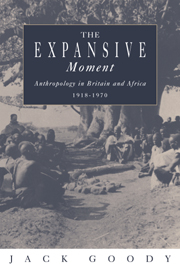Book contents
- Frontmatter
- Contents
- Introduction
- 1 The economic and organisational basis of British social anthropology in its formative period, 1930–1939: social reform in the colonies
- 2 Training for the field: the sorcerer's apprentices
- 3 Making it to the field as a Jew and a Red
- 4 Personal and intellectual friendships: Fortes and Evans-Pritchard
- 5 Personal and intellectual animosities: Evans-Pritchard, Malinowski and others
- 6 The Oxford Group
- 7 Some achievements of anthropology in Africa
- 8 Personal contributions
- 9 Concluding remarks
- Appendix 1 Changing research schemes
- Appendix 2 Towards the study of the history of social anthropology
- Notes
- List of references
- Index
4 - Personal and intellectual friendships: Fortes and Evans-Pritchard
Published online by Cambridge University Press: 30 September 2009
- Frontmatter
- Contents
- Introduction
- 1 The economic and organisational basis of British social anthropology in its formative period, 1930–1939: social reform in the colonies
- 2 Training for the field: the sorcerer's apprentices
- 3 Making it to the field as a Jew and a Red
- 4 Personal and intellectual friendships: Fortes and Evans-Pritchard
- 5 Personal and intellectual animosities: Evans-Pritchard, Malinowski and others
- 6 The Oxford Group
- 7 Some achievements of anthropology in Africa
- 8 Personal contributions
- 9 Concluding remarks
- Appendix 1 Changing research schemes
- Appendix 2 Towards the study of the history of social anthropology
- Notes
- List of references
- Index
Summary
To see the work of British anthropologists of the 1930s, even in Africa, as being largely under Malinowski's patronage is correct. Most of the early teachers of the post-war period had worked with him. But that does not mean to imply that they were passive followers or that subgroups did not form within the tribe. Such differentiation took place early on, the friendships and animosities leading to a physical separation (Oxford from the LSE) as well as to a theoretical parting of the ways as between Malinowski's functionalism and Radcliffe-Brown's structuralism, which brought the work closer to that of the French sociological school under Durkheim. It was the latter that gradually achieved dominance but only after Malinowski's death in 1942. That is the story behind the next three chapters.
I have outlined the events that led to Fortes shifting his focus of interest from psychology to anthropology. Intellectual concerns had moved him in that direction following his involvement in studies of children and adolescents in a deprived area of the East End at a time of world depression. But symbolically and actually the shift was carried out as a result of his encounter with the anthropologist Malinowski, at the house of the psychologist, Flügel. That led to his meeting other members of the seminar, of whom the most important for him were the later arrivals, Siegfried Nadel who came from Berlin to take up a Fellowship at the Institute, Raymond Firth, who returned from Sydney early in 1933, but above all an anthropologist who was already marginal to the seminar, Edward Evans-Pritchard.
- Type
- Chapter
- Information
- The Expansive MomentThe rise of Social Anthropology in Britain and Africa 1918–1970, pp. 58 - 67Publisher: Cambridge University PressPrint publication year: 1995



